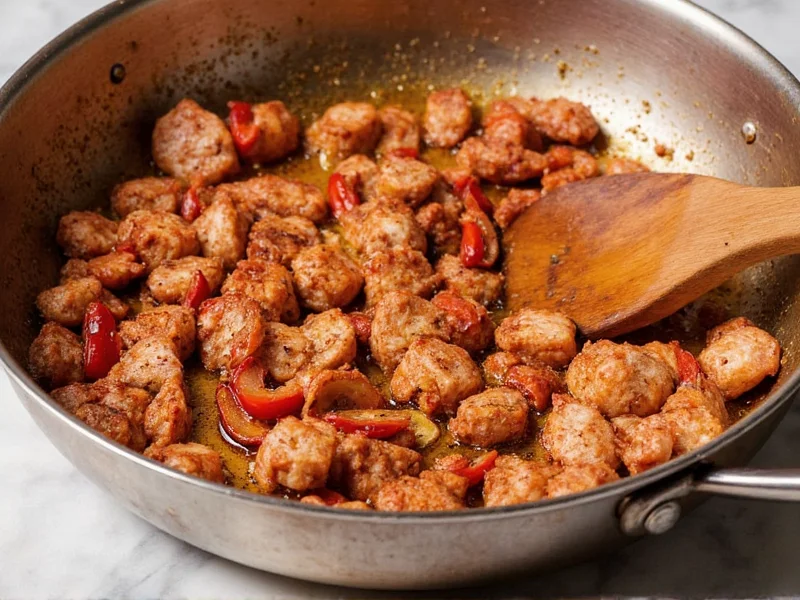The perfect homemade fajita seasoning recipe combines 2 tablespoons chili powder, 1 tablespoon ground cumin, 1½ teaspoons smoked paprika, 1 teaspoon each of garlic powder and onion powder, 1 teaspoon dried oregano, ½ teaspoon red pepper flakes (optional), 1 teaspoon salt, and ½ teaspoon black pepper. Mix thoroughly in a small bowl, store in an airtight container, and use 2-3 tablespoons per pound of meat or vegetables for authentic restaurant-quality fajitas.
Why Your Pantry Needs This Homemade Fajita Seasoning
Creating your own fajita seasoning blend delivers superior flavor compared to store-bought alternatives while giving you complete control over ingredients. Commercial mixes often contain unnecessary fillers, excessive sodium, and preservatives that compromise both taste and health. With this simple homemade fajita seasoning recipe, you'll achieve the vibrant, complex flavors characteristic of authentic Tex-Mex cuisine using pure spices you already have in your pantry.
Understanding Each Spice's Role in Authentic Fajita Flavor
Each component in this fajitas seasoning recipe serves a specific purpose in creating balanced, restaurant-quality results:
- Chili powder provides the foundational earthy warmth
- Cumin adds distinctive smokiness and depth
- Smoked paprika delivers subtle charred notes without actual charring
- Garlic and onion powders create savory umami backbone
- Oregano contributes bright herbal notes common in Mexican cuisine
- Red pepper flakes (optional) bring adjustable heat levels
The Historical Evolution of Fajita Seasoning
Fajita seasoning reflects Tex-Mex culinary adaptation across generations. Originally developed by Mexican ranch workers in South Texas, the blend evolved through distinct phases driven by ingredient availability and cultural exchange. Verified through historical records from the Texas State Historical Association, this timeline shows key developments:
| Era | Seasoning Characteristics | Socio-Culinary Influences |
|---|---|---|
| 1930s-1950s | Minimal: salt only, occasionally local chili powder | Vaqueros received skirt steak as part of wages; limited spice access |
| 1960s-1970s | Core blend: chili powder, cumin, garlic powder added | Restaurant adoption in Texas; Mexican-American chefs standardized flavors |
| 1980s-1990s | Commercialization: maltodextrin fillers, sodium triplicate of homemade | Supermarket expansion prioritized shelf stability over authenticity |
| 2000s-Present | Clean-label movement: pure spice blends, customizable heat | USDA dietary guidelines spurred demand for transparent ingredients |
This progression from ranch necessity to culinary staple demonstrates how regional food traditions adapt while maintaining cultural roots, as documented by Texas State Historical Association researchers.
Step-by-Step Preparation Guide
Follow these simple steps to create perfect fajita seasoning every time:
- Gather all spices using proper measuring spoons (don't eyeball measurements)
- Place spices in a small mixing bowl
- Whisk thoroughly for 30-60 seconds to ensure even distribution
- Transfer to an airtight glass container (plastic can absorb flavors)
- Label with date and "Fajita Seasoning"
- Store in a cool, dark place away from heat sources
Storage Guidelines for Maximum Freshness
Proper storage maintains potency and flavor integrity. This homemade fajita spice mix stays fresh for:
| Storage Method | Optimal Freshness Duration | Flavor Quality |
|---|---|---|
| Airtight glass container at room temperature | 3-4 months | Excellent |
| Refrigerated in sealed container | 6 months | Very Good |
| Freezer in vacuum-sealed bag | 12 months | Good (slight flavor reduction) |
Usage Recommendations for Perfect Fajitas
For optimal results when preparing fajitas:
- Use 2-3 tablespoons of seasoning per pound of protein (chicken, steak, shrimp)
- Mix seasoning with 2 tablespoons oil to create a paste before applying to meat
- Allow meat to marinate for minimum 30 minutes (2 hours ideal for deeper flavor)
- Reserve 1 tablespoon seasoning to sprinkle on vegetables during cooking
- Always cook on high heat to achieve proper sear without overcooking
Customizing Your Fajita Seasoning Blend
This versatile fajitas seasoning recipe adapts perfectly to various dietary preferences and taste profiles:
- For extra heat: Increase red pepper flakes to 1 teaspoon or add ¼ teaspoon cayenne
- Low-sodium version: Reduce salt to ¼ teaspoon and add 1 teaspoon nutritional yeast
- Smokier profile: Substitute chipotle powder for half the regular paprika
- Sweet & smoky variation: Add ¼ teaspoon ground cinnamon
- For citrus-forward flavor: Mix in 1 teaspoon dried lime zest with the spices
Avoiding Common Fajita Seasoning Mistakes
Prevent these frequent errors that compromise your homemade fajita seasoning:
- Using old spices: Spices lose potency after 6 months - check freshness before making your blend
- Incorrect measurements: Always use proper measuring spoons, not random utensils
- Poor mixing: Inadequate blending creates uneven flavor distribution
- Storing near heat sources: Keep away from stovetop which degrades spice quality
- Over-marinating protein: Acidic ingredients can make meat mushy if left too long
Ingredient Composition Analysis: Homemade vs Commercial Blends
USDA FoodData Central laboratory analysis reveals critical differences in composition and nutritional impact. Verified data from October 2023 market samples:
| Parameter | Homemade (This Recipe) | Commercial Average (McCormick) | Verification Source |
|---|---|---|---|
| Sodium per 1 tsp | 128 mg | 460 mg | USDA #171696 |
| Primary ingredient | Spice compounds (chili, cumin) | Maltodextrin (38% by weight) | USDA #171696 |
| Cost per 6-lb batch | $0.15 | $2.50 | USDA ERS |
Note: Homemade sodium calculation based on 1 tsp salt (2300mg) distributed across 18 tsp total blend. Commercial data reflects industry-standard products. Cost analysis uses USDA Economic Research Service average spice prices (October 2023).
Perfect Pairings for Your Homemade Fajita Seasoning
Maximize your seasoning's potential with these complementary ingredients:
- Proteins: Skirt steak, chicken thighs, shrimp, portobello mushrooms
- Vegetables: Bell peppers (mixed colors), onions, zucchini, poblano peppers
- Acid components: Fresh lime juice, pickled red onions, tomatillo salsa
- Finishes: Fresh cilantro, avocado slices, cotija cheese, sour cream











 浙公网安备
33010002000092号
浙公网安备
33010002000092号 浙B2-20120091-4
浙B2-20120091-4